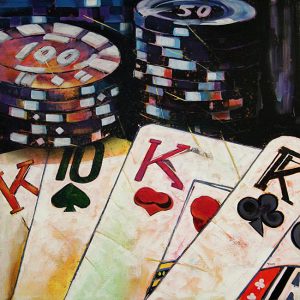
In order to further analyse the behavioural patterns of competitors, we need to discuss the important concept of levelling.
There is probably no other word in the poker dictionary that is so misunderstood and misused. Players use the term to justify every terrible play and to explain all complex phenomena. In poker parlance, it has become the expression "to fool someone". It has become so vague that, in order to understand it, we need to define the term itself very clearly.
The concept of levelling is misunderstood because of the subtext of the language. When we talk about "levels", especially when we say that something is at a higher "level", we are metaphorically putting everything in a vertical position. Therefore, if we talk about something that is on a lower level, we would see it on the ground, something higher would be somewhere in the sky, and if it is even higher, it would be above the clouds and so on. We would put it in a similar way to the layers of the atmosphere. Imagine good poker players playing at such a fantastically high "level" that it would be impossible for us even to comprehend what has just happened between them, up there.
But what is a "level"? Let's be precise here. When we choose a single level, what we are really choosing is a single action or strategy. When our opponent tries to counter our strategy, the level "above that" is what counters his counter-strategy. And above that?
In fact, there is nothing above that anymore.
Let's look at an example. Let's say a very drawy board ends up with the following cards 4♥9♥7♣2♣2♦. There were many different draws, but they are all now missed. Now the opponent's move, he bets on every street. He has also shown us that he is a risk-taker and a money man. In this case, our first "level" would be to catch his bluff, because we expect him to bet again. If the contestant has guessed our conclusions, he may not bluff at all. But if we get ahead of this by consistently making calls and not catching any bluff, we will reach the second "level". Now let's say he has a very strong insight and expects us to make a high level call, so he goes back to his original strategy to withstand this change. This is his third "level". Our third level would be to go back to bluff-catching. I stress that level one and level three are identical strategies. So where is the difference?
Flexibility comes from adaptability. Players who play at the first level rarely deviate from their level. Level 1 is also characterised by the fact that it is a game played by most poor players and that it requires a low level of awareness. Level two is defined as a counter-strategy to level one, it is like a correction to level one. The use of a second level does not necessarily imply flexibility in alternating levels. A level two player can stay in level two by continuously exploiting level one players.
So when we say that the game has reached level 3, what we really mean is that it is a deliberate choice to play at level 1, when someone has chosen to play at level 1 with the flexibility and knowledge that they can always move between different "levels" depending on  gameplay. And above that?
gameplay. And above that?
There is no need to talk about a "level" above level 3. It's a stupid idea, but it betrays the fact that most people don't understand how a fine-tuned game works. As you can see, in theory there are only two levels, but we arbitrarily decide to define the first level as the level for people who cannot participate in the leveling game. To say that someone is playing a level 5 game is meaningless. Level three is simply a repetition of level one strategy, level four would be a repetition of level two, level five, again a repetition of level one strategy, and so on.
Level 3 is actually a free-flow game, with adjustments between levels 1 and 2. A level one player will hardly ever or very rarely adjust his game, a level two player may also get stuck in it by exploiting level one. The third type of player is flexible, aware and skilful in choosing the situations in which he or she moves between the levels. In a high-level game, you can see the interaction between the first and the second "level".
The most important thing is to know that the levelling game is over. It does not keep going up and up in the air. It is finite and defeatable. There is nothing special about playing at a high level that prevents you from playing with them at "their level". Once you reach a conscious degree of flexibility, the same arena opens up for you as for them.
Leveling is essentially a guessing game, like rock-paper-scissors. The player guesses what level his opponent will choose and adjusts his strategy accordingly. Very similar to the flow of the game. If we define game flow as the skill of reading and guessing the opponent's preconceived game patterns, then similarly the skill of levelling is the ability to predict the counter-strategy pattern that the opponent will choose.





